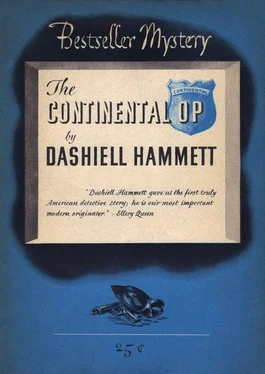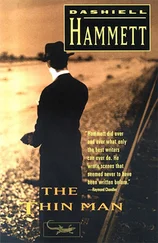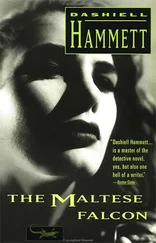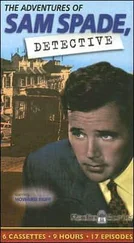Dashiell Hammett
The Continental Op [1] In chronological order.
Originally published under the pseudonym Peter Collinson
Originally appeared in The Black Mask , 1 October 1923
Jim Tarr picked up the cigar I rolled across his desk, looked at the band, bit off an end, and reached for a match.
“Three for a buck,” he said. “You must want me to break a couple of laws for you this time.”
I had been doing business with this fat sheriff of Sacramento County for four or five years — ever since I came to the Continental Detective Agency’s San Francisco office — and I had never known him to miss an opening for a sour crack; but it didn’t mean anything.
“Wrong both times,” I told him. “I get them for two bits each, and I’m here to do you a favor instead of asking for one. The company that insured Thornburgh’s house thinks somebody touched it off.”
“That’s right enough, according to the fire department. They tell me the lower part of the house was soaked with gasoline, but the Lord knows how they could tell — there wasn’t a stick left standing. I’ve got McClump working on it, but he hasn’t found anything to get excited about yet.”
“What’s the layout? All I know is that there was a fire.”
Tarr leaned back in his chair and bellowed:
“Hey, Mac!”
The pearl push buttons on his desk are ornaments so far as he is concerned. Deputy sheriffs McHale, McClump, and Macklin came to the door together — MacNab apparently wasn’t within hearing.
“What’s the idea?” the sheriff demanded of McClump. “Are you carrying a bodyguard around with you?”
The two other deputies, thus informed as to whom “Mac” referred this time, went back to their cribbage game.
“We got a city slicker here to catch our firebug for us,” Tarr told his deputy. “But we got to tell him what it’s all about first.”
McClump and I had worked together on an express robbery several months before. He’s a rangy, towheaded youngster of twenty-five or six, with all the nerve in the world — and most of the laziness.
“Ain’t the Lord good to us?”
He had himself draped across a chair by now — always his first objective when he comes into a room.
“Well, here’s how she stands: This fellow Thornburgh’s house was a couple miles out of town, on the old county road — an old frame house. About midnight, night before last, Jeff Pringle — the nearest neighbor, a half-mile or so to the east — saw a glare in the sky from over that way, and phoned in the alarm; but by the time the fire wagons got there, there wasn’t enough of the house left to bother about. Pringle was the first of the neighbors to get to the house, and the roof had already fallen in then.
“Nobody saw anything suspicious — no strangers hanging around or nothing. Thornburgh’s help just managed to save themselves, and that was all. They don’t know much about what happened — too scared, I reckon. But they did see Thornburgh at his window just before the fire got him. A fellow here in town — name of Henderson — saw that part of it too. He was driving home from Wayton, and got to the house just before the roof caved in.
“The fire department people say they found signs of gasoline. The Coonses, Thornburgh’s help, say they didn’t have no gas on the place. So there you are.”
“Thornburgh have any relatives?”
“Yeah. A niece in San Francisco — a Mrs. Evelyn Trowbridge. She was up yesterday, but there wasn’t nothing she could do, and she couldn’t tell us nothing much, so she went back home.”
“Where are the servants now?”
“Here in town. Staying at a hotel on I Street. I told ’em to stick around for a few days.”
“Thornburgh own the house?”
“Uh-huh. Bought it from Newning & Weed a couple months ago.”
“You got anything to do this morning?”
“Nothing but this.”
“Good. Let’s get out and dig around.”
We found the Coonses in their room at the hotel on I Street. Mr. Coons was a small-boned, plump man with the smooth, meaningless face and the suavity of the typical male house-servant.
His wife was a tall, stringy woman, perhaps five years older than her husband — say, forty — with a mouth and chin that seemed shaped for gossiping. But he did all the talking, while she nodded her agreement to every second or third word.
“We went to work for Mr. Thornburgh on the fifteenth of June I think,” he said, in reply to my first question. “We came to Sacramento, around the first of the month, and put in applications at the Allis Employment Bureau. A couple of weeks later they sent us out to see Mr. Thornburgh, and he took us on.”
“Where were you before you came here?”
“In Seattle, sir, with a Mrs. Comerford; but the climate there didn’t agree with my wife — she has bronchial trouble — so we decided to come to California. We most likely would have stayed in Seattle, though, if Mrs. Comerford hadn’t given up her house.”
“What do you know about Thornburgh?”
“Very little, sir. He wasn’t a talkative gentleman. He hadn’t any business that I know of. I think he was a retired seafaring man. He never said he was, but he had that manner and look. He never went out or had anybody in to see him, except his niece once, and he didn’t write or get any mail. He had a room next to his bedroom fixed up as a sort of workshop. He spent most of his time in there. I always thought he was working on some kind of invention, but he kept the door locked, and wouldn’t let us go near it.”
“Haven’t you any idea at all what it was?”
“No, sir. We never heard any hammering or noises from it, and never smelled anything either. And none of his clothes were ever the least bit soiled, even when they were ready to go out to the laundry. They would have been if he had been working on anything like machinery.”
“Was he an old man?”
“He couldn’t have been over fifty, sir. He was very erect, and his hair and beard were thick, with no gray hairs.”
“Ever have any trouble with him?”
“Oh, no, sir! He was, if I may say it, a very peculiar gentleman in a way; and he didn’t care about anything except having his meals fixed right, having his clothes taken care of — he was very particular about them — and not being disturbed. Except early in the morning and at night, we’d hardly see him all day.”
“Now about the fire. Tell us everything you remember.”
“Well, sir, my wife and I had gone to bed about ten o’clock, our regular time, and had gone to sleep. Our room was on the second floor, in the rear. Some time later — I never did exactly know what time it was — I woke up, coughing. The room was all full of smoke, and my wife was sort of strangling. I jumped up, and dragged her down the back stairs and out the back door.
“When I had her safe in the yard, I thought of Mr. Thornburgh, and tried to get back in the house; but the whole first floor was just flames. I ran around front then, to see if he had got out, but didn’t see anything of him. The whole yard was as light as day by then. Then I heard him scream — a horrible scream, sir — I can hear it yet! And I looked up at his window — that was the front second-story room — and saw him there, trying to get out the window! But all the woodwork was burning, and he screamed again and fell back, and right after that the roof over his room fell in.
“There wasn’t a ladder or anything that I could have put up to the window — there wasn’t anything I could have done.
“In the meantime, a gentleman had left his automobile in the road, and come up to where I was standing; but there wasn’t anything we could do — the house was burning everywhere and falling in here and there. So we went back to where I had left my wife, and carried her farther away from the fire, and brought her to — she had fainted. And that’s all I know about it, sir.”
Читать дальше












